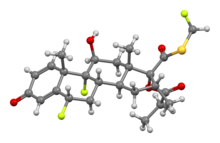Fluticasone propionate
 | |
 | |
| Clinical data | |
|---|---|
| Trade names | Flovent, Flixotide, Flonase, others |
| AHFS/Drugs.com | Monograph |
| MedlinePlus | a695002 |
| License data | |
| Pregnancy category |
|
| Routes of administration | Intranasal,[2] inhalation,[3] topical[4] |
| Drug class | Steroids and steroid derivatives |
| ATC code | |
| Legal status | |
| Legal status | |
| Pharmacokinetic data | |
| Bioavailability | 0.51% (Intranasal) |
| Protein binding | 91% |
| Metabolism | Intranasal Liver (CYP3A4-mediated) |
| Elimination half-life | 10 hours |
| Excretion | Kidney |
| Identifiers | |
| |
| CAS Number | |
| PubChem CID | |
| IUPHAR/BPS | |
| DrugBank | |
| ChemSpider | |
| UNII | |
| KEGG | |
| ChEBI | |
| ChEMBL | |
| CompTox Dashboard (EPA) | |
| ECHA InfoCard | 100.129.097 |
| Chemical and physical data | |
| Formula | C25H31F3O5S |
| Molar mass | 500.57 g·mol−1 |
| 3D model (JSmol) | |
| |
| |
| (verify) | |
Fluticasone propionate, sold under the brand names Flovent and Flonase among others, is a glucocorticoid steroid medication.[8] When inhaled it is used for the long term management of asthma and COPD.[8] In the nose it is used for hay fever and nasal polyps.[9][10] It can also be used for mouth ulcers.[11] It works by decreasing inflammation.
Common side effects when inhaled include upper respiratory tract infections, sinusitis, thrush, and cough.[8] Common side effects when used in the nose include nosebleeding and sore throat.[9] Unlike fluticasone furoate, which is approved in children as young as two years of age when used for allergies, fluticasone propionate is only approved for children four years and older.[12][13]
Fluticasone propionate was patented in 1980, and approved for medical use in 1990.[14] It is available as a generic medication.[10] In 2022, fluticasone was the 25th most commonly prescribed medication in the United States, with more than 22 million prescriptions.[15][16]
Medical uses
[edit]Fluticasone propionate is used by powder or aerosol inhalation for the prophylaxis of asthma.[3][8] The nasal spray is used for prevention and treatment of allergic rhinitis.[2] Nasal drops are used in the treatment of nasal polyps. The nasal spray can also be used in the mouth for mouth ulcers.[11]
Fluticasone propionate in a topical form can be used to treat skin conditions such as eczema, psoriasis, and rashes.[17][18]
Adverse effects
[edit]The nasal spray and oral inhaler formulation have fewer corticosteroid side effects than the tablet formulation because they limit systemic (blood) absorption.[2] However, systemic absorption is not negligible even with correct administration.[2][specify] Using the spray or inhaler at higher than recommended doses or with other corticosteroids can increase the risk for serious, systemic corticosteroid induced side effects.[2][3] These side effects include weakened immune system, increased risk of systemic infections, osteoporosis, and elevated pressure in the eyes.[19]
Nasal spray
[edit]
Common side effects may include nasal irritation (burning, stinging, bleeding), headache, upset stomach (nausea, vomiting), and diarrhea. Rare side effects include infection (evidenced by, for example, fever, sore throat, and cough), vision problems, severe swelling, hoarse voice, and difficulty breathing or swallowing.[20][9][2]
Inhaled
[edit]Common side effects may include upper respiratory tract infection, throat irritation, thrush, cough, and headache. Rare side effects include bruising, swelling of the face/neck, depression, tiredness, and shortness of breath.[21][8][3]
Pharmacology
[edit]Fluticasone propionate is a highly selective agonist at the glucocorticoid receptor with negligible activity at androgen, estrogen, or mineralocorticoid receptors,[4] thereby producing anti-inflammatory and vasoconstriction effects. It has been shown to have a wide range of inhibitory effects on multiple cell types (e.g. mast cell, eosinophil, neutrophil, macrophages, and lymphocytes) and mediators (e.g. histamine, eicosanoids, leukotrienes, and cytokines) involved in inflammation. Fluticasone propionate is stated to exert a topical effect on the lungs without significant systemic effects at usual doses, due to its low systemic bioavailability.[20]
Interactions
[edit]Fluticasone propionate is broken down by CYP3A4 (cytochrome P450 3A4), and has been shown to interact with strong CYP3A4 inhibitors such as ritonavir and ketoconazole.[2][3] Coadministration of ritonavir and fluticasone may lead to increased levels of fluticasone in the body, which may lead to Cushing's Syndrome and adrenal insufficiency.[22] Ketoconazole, an antifungal drug, has been shown to increase fluticasone concentration leading to systemic corticosteroid side effects.[2][3]
Society and culture
[edit]In 2024, GSK plc removed Flovent from the market and replaced it with an authorized generic.[23][24]
References
[edit]- ^ "Fluticasone Use During Pregnancy". Drugs.com. 9 January 2019. Archived from the original on 26 March 2019. Retrieved 31 January 2020.
- ^ a b c d e f g h "Flonase Allergy Relief- fluticasone propionate spray, metered". DailyMed. 30 May 2019. Archived from the original on 2 December 2020. Retrieved 31 January 2020.
- ^ a b c d e f "Flovent Diskus- fluticasone propionate powder, metered". DailyMed. 7 January 2019. Archived from the original on 7 December 2019. Retrieved 31 January 2020.
- ^ a b c "Cutivate- fluticasone propionate lotion". DailyMed. 8 August 2018. Archived from the original on 20 February 2022. Retrieved 19 February 2022.
- ^ "Prescription medicines: registration of new generic medicines and biosimilar medicines, 2017". Therapeutic Goods Administration (TGA). 21 June 2022. Retrieved 30 March 2024.
- ^ "Respiratory health". Health Canada. 9 May 2018. Retrieved 13 April 2024.
- ^ "Flixonase Aqueous Nasal Spray - Summary of Product Characteristics (SmPC)". (emc). 25 October 2019. Archived from the original on 31 January 2020. Retrieved 31 January 2020.
- ^ a b c d e "Fluticasone Propionate Monograph for Professionals". Drugs.com. American Society of Health-System Pharmacists. Archived from the original on 28 February 2019. Retrieved 27 February 2019.
- ^ a b c "Fluticasone Propionate eent Monograph for Professionals". Drugs.com. American Society of Health-System Pharmacists. Archived from the original on 28 February 2019. Retrieved 27 February 2019.
- ^ a b British national formulary : BNF 76 (76 ed.). Pharmaceutical Press. 2018. pp. 262, 1172. ISBN 9780857113382.
- ^ a b "Flixonase aqueous spray" (PDF). Sheffield Teaching Hospitals. June 2018. Archived from the original (PDF) on 25 September 2019. Retrieved 31 January 2020.
- ^ "Flonase Sensimist Allergy Relief- fluticasone furoate spray, metered". DailyMed. 30 May 2019. Archived from the original on 2 December 2020. Retrieved 4 February 2020.
- ^ "Veramyst- fluticasone furoate spray, metered". DailyMed. 1 March 2010. Archived from the original on 5 February 2020. Retrieved 4 February 2020.
- ^ Fischer J, Ganellin CR (2006). Analogue-based Drug Discovery. John Wiley & Sons. p. 487. ISBN 9783527607495. Archived from the original on 28 November 2023. Retrieved 19 September 2020.
- ^ "The Top 300 of 2022". clincalc.com. Retrieved 19 August 2024.
- ^ "Fluticasone - Drug Usage Statistics". ClinCalc. Retrieved 14 January 2024.
- ^ "Drugs & Medications". www.webmd.com. Archived from the original on 22 October 2020. Retrieved 13 April 2020.
- ^ Lax SJ, Harvey J, Axon E, Howells L, Santer M, Ridd MJ, et al. (Cochrane Skin Group) (March 2022). "Strategies for using topical corticosteroids in children and adults with eczema". The Cochrane Database of Systematic Reviews. 2022 (3): CD013356. doi:10.1002/14651858.CD013356.pub2. PMC 8916090. PMID 35275399.
- ^ "Prednisone and other corticosteroids: Balance the risks and benefits". Mayo Clinic. Archived from the original on 25 May 2017. Retrieved 4 March 2018.
- ^ a b "Fluticasone Nasal Spray: MedlinePlus Drug Information". MedlinePlus. Archived from the original on 5 September 2023. Retrieved 14 October 2023.
- ^ "Fluticasone Oral Inhalation". AHFS Consumer Medication Information [Internet]. Bethesda (MD): American Society of Health-System Pharmacists, Inc. 1 September 2010 [2008]. Archived from the original on 3 November 2014. Retrieved 2 November 2014.
- ^ Foisy MM, Yakiwchuk EM, Chiu I, Singh AE (July 2008). "Adrenal suppression and Cushing's syndrome secondary to an interaction between ritonavir and fluticasone: a review of the literature". HIV Medicine. 9 (6): 389–96. doi:10.1111/j.1468-1293.2008.00579.x. PMID 18459946. S2CID 40502127.
- ^ Sydney Lupkin (30 December 2023). "A popular asthma inhaler is leaving pharmacy shelves. Here's what you need to know". NPR.
- ^ Tirrell M (28 December 2023). "'A huge shock to the system': Doctors warn about asthma inhaler switch coming in January". CNN. Retrieved 10 January 2024.
External links
[edit] Media related to Fluticasone propionate at Wikimedia Commons
Media related to Fluticasone propionate at Wikimedia Commons- "Fluticasone Topical". MedlinePlus.
